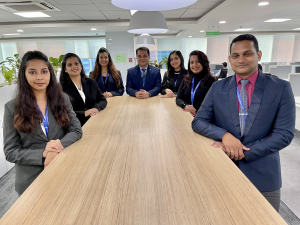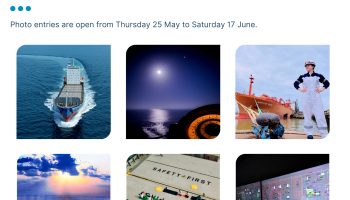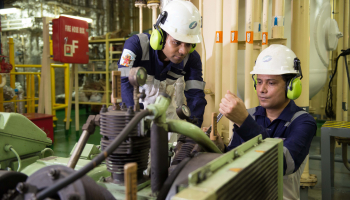Having an Environmental, Social, and Corporate Governance (ESG) framework and strategy in place is increasingly the way forward for corporates as many stakeholders – from ship owner customers to investors, lenders, and even insurance providers are asking more questions related to ESG monitoring and performance. While every company’s sustainability journey will look a little bit different, at the core it’s about embedding sustainability into the mindset and culture of the organisation. One that is consciously aware of the business’ impact on our people, communities, and environmental and social systems around them.
In the maritime world, ambitious goals and targets are being set for a zero-carbon future, and as a leading ship manager, we want to do our part and set things in the right direction towards a future that is successful and sustainable. This year we have started out on our ESG journey and we’re currently in the process of building an ESG framework with a commitment to developing a sustainable strategy backed by credible and realistic goals and targets. Sustainability is of great strategic importance to our business and with our ESG strategy in place, we can begin the processes of embedding sustainability into our core business strategy and processes.
We aim to publish our first sustainability report in early 2022. Until then, we’re pleased to share some insight into how we’re approaching ESG and sustainability in the context of our business and the industry.
Environment
On the Environmental front, in 2018 the IMO adopted a strategy to reduce greenhouse gas emissions that also compliments the UN Sustainable Development Goal 13, calling for urgent actions to combat climate change and its impacts.
Shipping has since witnessed quite a seismic shift in the sense that as an industry, ambitious goals and targets are being set along with a series of strict regulatory requirements to monitor and control carbon emissions generated from ships. So we all see the end goal and the bigger picture – and from our perspective – we absolutely want to get there and support the industry and our ship owner customers as we collectively move in this direction.
Alternative fuel is currently where a lot of the focus is at the moment, and while fuel is absolutely one of the solutions to a net-zero carbon emissions reality, the fact is a lot of research and studies are in development and at this point there is no clear winner or ‘silver bullet’ answer. Every alternate fuel offers both advantages and challenges – there are many considerations around fuel supply and its entire supply chain and infrastructure. What we don’t advocate for is forcing ship owners to choose or commit to one option and run the risk of them having invested in a stranded asset. From the perspective of a ship manager, flexibility is key in terms of being compliant with the range of emissions rules and regulations that are on the horizon, while also being able to remain competitive not just today but for the lifecycle of a vessel.
At present, FLEET manages vessels, which use all three types of commercially available dual fuels (LPG, LNG and Methanol) and these appear to be the best solutions right now. We are collaborating with industry partners on various fuel studies and feasibility tests. It’s as important for us to have a broad view of what’s happening in the industry from a regulatory standpoint as much as it is to be deeply entrenched in the technical details so that we’re in a strong position to advise our clients. Our job is to ensure that our crew and onshore support teams are properly trained to support a ship owners’ green transition pathway and decarbonisation plan.
Taxes on carbon emissions is a hotly debated topic these days – especially as things are picking up in the EU region. We can expect this conversation to really come to the forefront in the coming year and as a company, we are doing our part by participating in the dialogue via our representation in key industry organisations and bodies. It’s incredibly important for us to voice our perspective as one ship manager who also represents the interests of hundreds of the world’s ship owners and tens of thousands of seafarers. We should have an opportunity to inform the policies and regulations that are introduced as ultimately, we will be relying on our crew to help implement and drive change at a tactical level.
Social
The Social aspect of ESG is an area we believe we can have a significant impact on. At the core of our business – in fact, our value proposition as a third party ship manager – is providing seamless service from ship to shore. So in that respect, it is all about our people both onshore and offshore. FLEET is a service provider with a network of over 24,000 seafarers who collaborate with around 1,000 maritime professionals across our 27 offices globally. The wellbeing and satisfaction of our people are very important to us and we have the ambition and desire to do more in this space. The ESG framework will certainly help bring this to the forefront in a transparent manner and allow us to have a greater impact on core issues that align with our business.
As we always say, our crew is at the heart of what we do, and so it goes without saying that the past year and a half we have been focusing our efforts on helping them get through what will surely be one of humanity’s most challenging times. In addition to having a dedicated team (FLEET Care) providing support and service to our seafarers, we added counselling services specifically to help with challenges around mental health including a 24/7 helpline and an in-house psychologist. We have voiced our concerns with the crew change crisis and continue to work with our industry peers and partners to find ways to alleviate the problems with crew change, with considerations such as crew vaccination, shore leave, and easing travel at the top of our agenda.

We’re also taking a closer look at the positive impact we can make on the communities within our reach. Our partnership with Sankalp Taru Foundation, an India-based NGO, is committed to distributing 10,000 fruit-bearing tree saplings to marginalised farmers in the rural areas of Maharashtra, Punjab and Rajasthan as part of our Gifting a Green Life programme. With the saplings, we’re hoping to better farmers’ livelihoods in India while fighting climate change. Considering the average lifespan of a fruit-bearing tree is 20 years, these 10,000 saplings, when they grow, have the power to generate 19,980 tonnes of oxygen and sequester 10,424 tonnes of carbon dioxide, in 20 years. All 10,000 saplings have been planted and we have been able to offset 4,181 tonnes of carbon dioxide. In addition, all the trees have been gifted to seafarers as part of a ‘digital FLEET forest’ whereby we tag a seafarer to a sapling planted as a gift on their birthday or when they reach a milestone anniversary. This way, a seafarer can track their tagged tree throughout its entire life cycle. The progress of this initiative was very positively received and the clear impact of the programme gives us the confidence to do even more. All our work in this area to support the health and wellbeing of our crew and our larger communities will be part of our ESG strategy.
Governance
The Governance part of ESG is the backbone of the entire framework. This is the part that aligns us all – from FLEET’s management team to our customers, our colleagues on and offshore, and other industry stakeholders who are involved in supporting our daily operations. This is a part that will define the sustainability culture we build within our organisation. Backed by a common ESG vision, our sustainability ambitions will be the soul of all business operations for the coming years.
As IMO is part of the United Nations we intend to align with the UN Sustainability Development Goals. Our targets and the results will be measured under the Global Reporting Initiative standards.
Early this year, FLEET became a member of the Maritime Anti-Corruption Network (MACN), a global business network with members comprising ship owners and other maritime service providers. Cyber security is also an important area that will be addressed closely under our Governance scope.
Our ESG roadmap
In September 2021, The Caravel Group and FLEET embarked on our journey to develop an ESG strategy and roadmap that lays down a definitive approach on critical sustainability issues that matter to us. An ESG working team was created drawing from the different departments and experts across the company with the expectation to establish and govern the ESG policies and practices for the following four companies that are part of The Caravel Group: Fleet Management Limited, Caravel Maritime, Caravel Resources, and The Caravel Foundation. One of the most important success factors in kicking this work off was receiving full support and endorsement from our management team.
Sustainability is like an insurance policy that will secure the future of our business and of the coming generations. This is not a goal we can achieve as individual employees – it’s truly a team effort. We welcome all of our colleagues, whether onboard our vessels or in our offices to be part of this journey and share in our desire to do our part for a better future. Join us!









